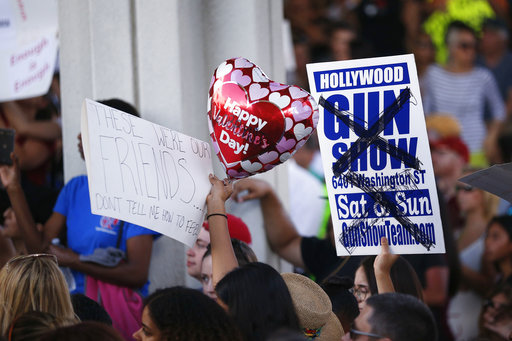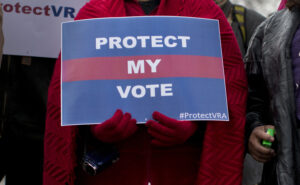ACLU Tells Student Protesters: Know Your Rights
One month after Parkland, a nationwide walkout to protest gun violence is planned for Wednesday. Demonstrators protest against guns outside the Broward County federal courthouse in Fort Lauderdale, Fla., on Feb. 17. ( Brynn Anderson / AP)
Demonstrators protest against guns outside the Broward County federal courthouse in Fort Lauderdale, Fla., on Feb. 17. ( Brynn Anderson / AP)
The first large-scale, coordinated national student walkout since the deadly shooting in Parkland, Fla., is planned for Wednesday.
Women’s March organizers have called for a 17-minute walkout, one minute for each of the 17 students and staff killed at Marjory Stoneman Douglas High School a month earlier. American Civil Liberties Union affiliates in more than a dozen states have advised school administrators to honor the students’ free speech rights and are pushing back against school districts that have threatened to punish those who walk out.
Dozens of colleges and universities, including Harvard, Yale, MIT, the University of Connecticut and UCLA, have assured high school students that participation in walkouts will not affect their chances of being admitted to those institutions. However, many middle school and high school administrators have come under fire for threatening students with suspension or other punishment for participating, even with parental permission.
Some schools have been receptive to the ACLU’s efforts to support student protesters. After the ACLU of Virginia confronted him over a threatening message he had sent to students, Steve Walts, superintendent of public schools in Prince William County, Va., sent out a letter saying he will help “develop a plan to enable students to exercise their constitutionally protected rights to free speech and demonstration, in safe and non-disruptive ways, without fear of disciplinary consequences.
The ACLU has been proactive in helping students know their rights when it comes to walkouts. It warned that schools can discipline students for missing class, but that those who miss class for political reasons cannot be punished more harshly than they would be for being absent for other reasons.
The exact punishment you could face will vary by your state, school district, and school. Find out more by reading the policies of your school and school district. If you’re planning to miss a class or two, look at the policy for unexcused absences. If you’re considering missing several days, read about truancy. And either way, take a look at the policy for suspensions. In some states and districts, suspension is not an available punishment for unexcused absences. And nationwide, if you are facing a suspension of 10 days or more, you have a right to a formal process and can be represented by a lawyer. Some states and school districts require a formal process for fewer days, too. Also, you should be given the same right to make up work just as any other student who missed classes.
Sarah Hinger, a staff attorney with the ACLU Racial Justice Program, writes:
Your support matters…School administrators owe it to their students to examine their reaction to young peoples’ self-expression and to ask how they can help build on this moment of protest as an educational experience. As the Supreme Court observed in Brown v. Board of Education, education is “the very foundation of good citizenship.” Public school is the place where students experience and interact with government, learn through discussion and debate with other students from differing backgrounds, and build the foundation for participation in a democratic society. Rather than seeking to silence students’ political engagement and quashing their desire for conversation, schools can approach this moment as an opportunity for learning about civic action.
Independent journalism is under threat and overshadowed by heavily funded mainstream media.
You can help level the playing field. Become a member.
Your tax-deductible contribution keeps us digging beneath the headlines to give you thought-provoking, investigative reporting and analysis that unearths what's really happening- without compromise.
Give today to support our courageous, independent journalists.






You need to be a supporter to comment.
There are currently no responses to this article.
Be the first to respond.